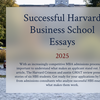When Sean P. McLaughlin '91 held the door open for a housemate's father last fall, he was only performing a common courtesy.
But McLaughlin, dressed in his Air Force ROTC uniform at the time, says he was suprised at the man's response.
"He made some snide comment," McLaughlin remembers. "Something like 'at least you [ROTC] guys are good for something.'"
"We fought about it [verbally] for 10 to 15 minutes," McLaughlin says.
McLaughlin's story--an "absurd situation," he terms it--exemplifies the verbal harassment some students in the Reserve Officers Training Corps (ROTC) say they have had to contend with here. From its tumultuous expulsion off campus in 1969 to last year's debate over returning the program to Harvard, ROTC has had an uneasy relationship with the University.
Most ROTC students admit that they have not been openly harassed, but many acknowledge that they have come to expect "dirty looks" and "stares" when they wear their uniforms.
"There's just a feeling, and that's sad that it exists," says Christina L. Ulses '90, a Navy ROTC student.
"I can feel it generally around campus...definitely a pervasive anti-ROTC feeling," says Mario Mancuso '91, an Army ROTC student. "It's something that you contend with, but you go on."
And though they may face a feeling of campus opposition, ROTC students unanimously continue to declare their pride in what they do, emphatically praising the "camaraderie," "morale" and "togetherness" of the ROTC program.
The cadets and midshipmen argue that ROTC is the best way they can explore new fields and fulfill their obligations as citizens while having their education funded by the government. Serving the government has become a source of unparalleled opportunity and pride in both family and country, they say.
Defending the Country
Currently on a two and-a-half year scholarship from Army ROTC, James P. Coleman '92 cites his family's "very big military tradition" and his "sense of moral patriotism" as the primary reasons for his enlistment.
"Since I was young, I was indoctrinated with the values of military life," says Coleman, whose father was a career military officer.
"I think it's important that clear-minded rational individuals be in a good position to defend the country," Coleman says. "I want to be trained to lead troops...to have a moral command."
Sang Yun Kim '92 says that real world experience compelled him to join Army ROTC.
Read more in News
Spring Facelift in the Works For Indoor Athletic Building












